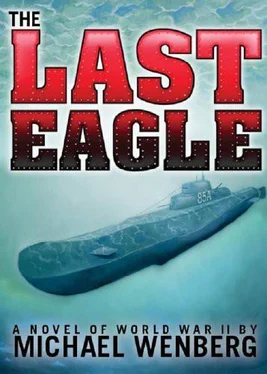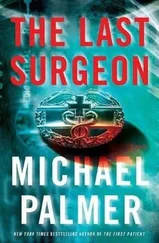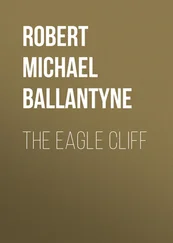Churchill had a sudden thought. He picked up his pen and added a postscript to his note to Roosevelt:
P.S. We believe two American news reporters—a man and woman (I am attempting to discover their names) —are aboard the Polish submarine Eagle now in the Baltic. She will undoubtedly be hunted by the Germans. I have no knowledge of her course or disposition, but I shall keep you informed should we come in contact with her or hear more news.
N. P.
Churchill rubbed his eyes. The bombing had stopped. He wondered where the Eagle was now. It wasn’t hard to imagine what they were experiencing. Depth charges must be a lot like what Londoners were facing. An unknown attacker from above. The click of a detonator and instant death. The inexplicable waiting from one moment to the next, wondering how much longer you might have to live.
Churchill folded the letter, set his still burning cigar to one side. He pushed back his chair, crossed to the other side of his room, unloosening his collar and belt as he went, and rolled onto his cot. He reached up and turned off the lamp on a table beside his cot. He would sleep. For a few hours, anyway. He closed his eyes, tried to clear his mind. But tonight sleep was even more difficult to find than usual. He couldn’t help wondering what it must be like to have 50 fathoms of water overhead, and the threat of someone waiting to destroy you if you surfaced. When he finally flicked the lamp back on a half an hour later, his pale forehead was damp with sweat. The bombing had started again. He quickly pulled on his shoes and slippers, his navy cap. He needed some air. The walls and ceilings in his basement office seemed to be pressing in on him from every side. He padded down the corridor followed by one of his personal guards, then started up the stairs, until he found himself on the building’s roof .
“Dangerous, sir,” the guard muttered, reminding Churchill of the obvious. “You shouldn’t be here.”
Churchill blew out a deep breath, looked up at the dark sky. The distant thrum of German bombers was easy to hear. It sounded like an orchard in spring heavy with buzz of ten thousand bees. To the east, the sky was punctuated with flashes from the anti-aircraft guns, and sliced by spotlights, weaving nervously back and forth. “No, this is fine. I can imagine worse places. Indeed I can.”
“Orders?” Talli stood, arms crossed, waiting.
Stefan heard the request, but he remained mute, his thoughts elsewhere. A magician had once visited his village when he was just a boy. He had tried to get close enough to see, but sharp elbows and jabs finally convinced him to give up, so, instead, he had climbed onto the roof of the building across the street. He crept up to the edge, and from there was able to peer down on the spectacle below just as the magician made chicken appear beneath a purple cloth that had moments before covered nothing but an egg. The crowd had gasped and then applauded with delight. Even though Stefan knew it had been a trick—it had to be—he couldn’t help being impressed. How had the magician done it? He had often wondered.
He was thinking about that magician now, wondering if that memory could inspire him to produce his own trick. He knew what his men expected. But he wasn’t sure he could summon enough of his own magic to get them to safety.
The Eagle had left the harbor far behind, and she was now following a twisting course dictated by the reassuring blinks of the occasional navigation buoys. Below deck, the radioman was attempting to contact the Polish base at Hel. But no word. Not a good sign, Stefan knew, but he kept that to himself. The radio transmitter could be destroyed, or worse, the Germans might have taken charge of the base.
Despite the lookouts, Stefan couldn’t help an occasional glance aft. He was surprised that no Estonian ships had taken up their pursuit. They had motor launches that were more than a match for Eagle’s speed. But the line of white foam, the only indication of their passing, faded into the darkness and they remained alone. But for how long?
According to Talli, they would soon pass beyond the last buoy. After that, they would be blind, navigating by the seat of their pants. Stefan knew the Baltic waters off the Estonian coastline were dotted with small islands and unseen rocky shoals lurking just a few meters below the water’s surface. One wrong move, and their jagged teeth could easily tear through the Eagle’s steel skin. Escape had been the easy part. Now that they had accomplished the unthinkable, where would they go? Stefan had always wanted command. But right at the moment, he would have gladly turned it over to someone else, even Sieinski. What was the saying? Be careful what you wish for, you just might get it. He had it in spades. But like it or not, he was in charge now, responsible for everyone on board. It was up to him. Or no one.
“Commander?” Talli cleared his throat.
Stefan breathed deeply through his nose, looked up at the sky. Unseen clouds shrouded the stars. The wind had shifted to the east a half an hour earlier; it was now blowing in increasing puffs. Maybe a storm by morning, Stefan thought. He could smell it on the breeze. Not a bad thing. They would be harder to find in nasty weather. The deck of the Eagle was already moving rhythmically, like a galloping horse, through the slight swells. She seemed as glad as her crew to be free. “What direction will they expect us to go?” Stefan asked, wondering if he decided to start wearing a magician’s cape, or began wielding a magic wand, it would make the future easier to see.
“Home.” Kate answered, turning away from the conning tower’s edge, pulling at the cigarette that dangled from the corner of her mouth.
After the escape from the harbor, Kate had stayed on the bridge. Stefan knew it was probably against a Polish Navy regulation to have any civilian, let alone, a civilian female, on the bridge when the threat of attack was imminent. But there was probably little left of the Polish Navy. And no one aboard would care if Stefan made up a few of his own rules. And so, Stefan had decided on the spot that rule number one would be this: let any gorgeous female stay on the bridge as long as she wanted— but only if she wasn’t a pain in the ass. He wondered how the rule would look, typed up on official paper and posted in the galley. It would give the men a good laugh, of that he was sure. Of course, the rule was tailored specifically to fit Kate. She was gorgeous, in a rough sort of way. And she wasn’t a pain in the ass. At least, not since leaving Tallin behind. In fact, she hadn’t said a word until now.
“Yes, I think you are right,” Talli said. He glanced at Stefan and when he made no move turned to Kate. “I’m sorry. We haven’t been formerly introduced. Commander Jaak Talli. Estonian Navy.” He bowed stiffly in Kate’s direction.
Kate flicked her cigarette into the wind, brushed back her hair with her open hand. “What is it with you guys? All the bowing and heel clicking.” She held out her hand. “Kate McLendon. I’m a reporter with NANS.”
Talli grabbed it and they shook. “American?”
“That, too.”
“My pleasure,” Talli said. “You can imagine my curiosity. You speak Polish very well. And I hope to hear how you ended up involved in all of this before I must leave.”
“You got a date, Jaak, for later on,” Kate said. “Might be helpful telling it to somebody. I’m not sure I’m going to believe it myself.”
“And so…” Talli began and then paused.
Stefan filled in the missing beat: “Please call me Stefan…” he said.
“As you like, Stefan. What is your home port?”
Читать дальше












